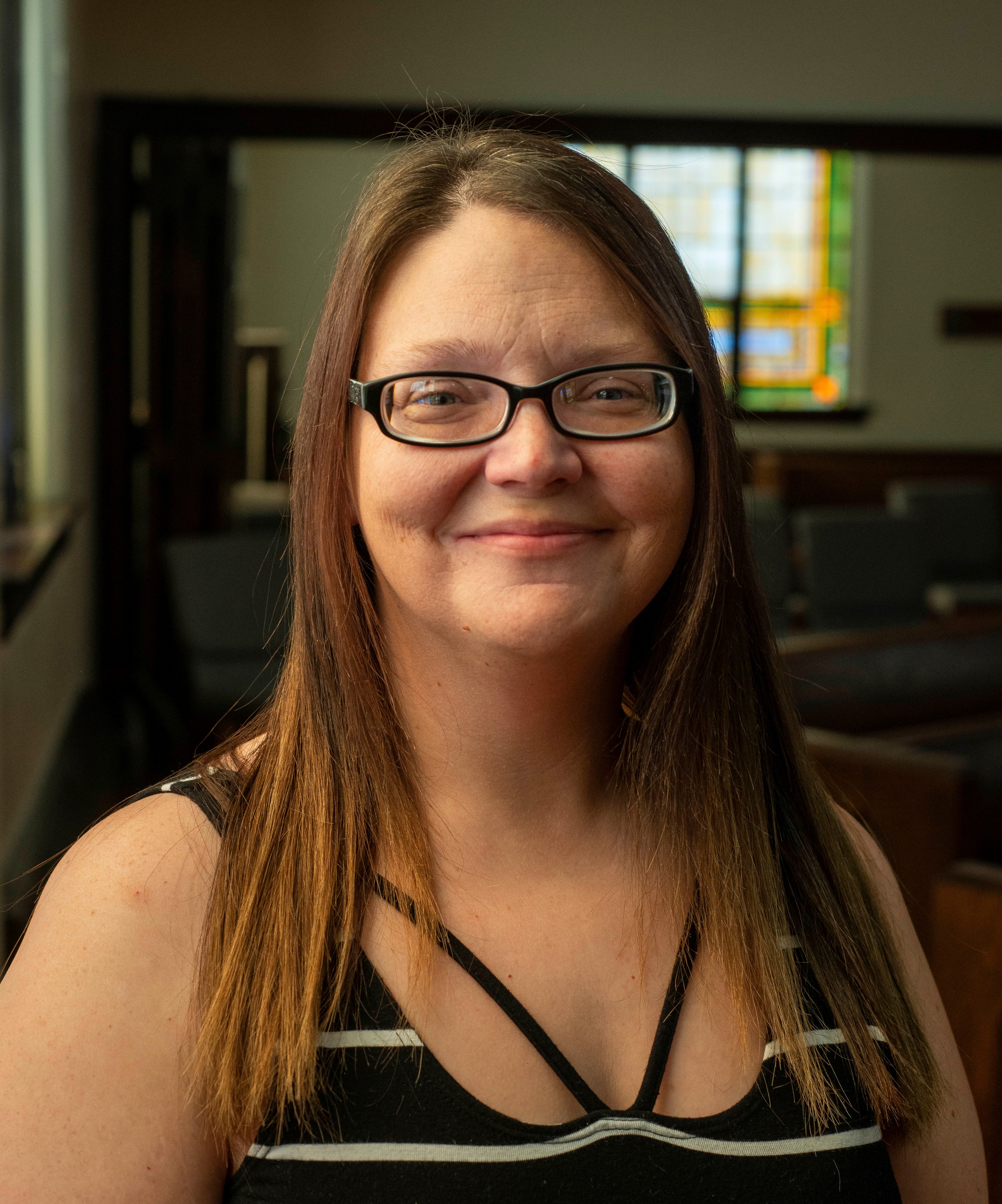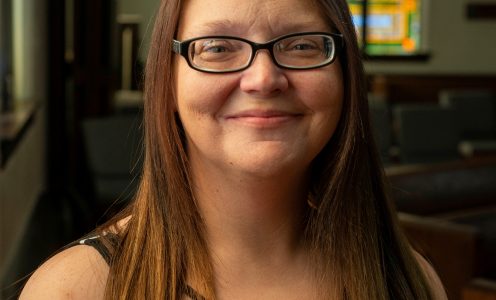Sara has a lot of keys these days.
She has one to The Lighthouse Recovery Home for women, one to Urban Light Community Church, one to the church van, one to Advanced Commercial Roofing, where she works as a manager. And Sara is hoping to get another soon, one to a house she can call her own. When she thinks about that, it’s shocking. Disorienting, but in a good way. Because it wasn’t so long ago that the only houses she set foot in were ones she broke into in the dead of night.
SELF-MEDICATING FOR ANXIETY
There were expectations for girls like Sara growing up in New Castle, Indiana. You’re going to be a “good girl” who goes to church and doesn’t complain. Sara’s parents divorced when she was three years old. She lived with her mom, a teacher, and her mother’s parents. Sara’s grandmother was a real estate agent. Her grandfather owned a grocery store.
It was supposed to be a safe, simple, small-town life. But Sara felt a pressure she didn’t understand. A fear that if she didn’t dress a certain way, talk a certain way, she wouldn’t be good enough. “I had a lot of anxiety,” Sara said. She found friends who accepted her no matter what she did. They showed her how to drink, smoke pot and take whatever drugs she could get until she didn’t feel anxious anymore. It was a revelation that would set the stage for the next two decades of Sara’s life.
Sara became skilled at hiding that side of her life. She was working full time at a fast food restaurant and attending college at IU East, but there are some things you can’t hide. She was 19 when she became pregnant and had her first daughter. Becoming a teenage mom was hard, but living with family of babysitters helped a lot. It also enabled her to maintain her lifestyle. “I would be there until my daughter went to sleep, go out and party and get drunk and be back before she woke up. I thought that was okay,” Sara said.
WHEN THE HIGH IS IN CONTROL
In May 2019, Sara brags on her four kids the way any parent would. She’s excited to watch a son play baseball, a daughter sing in the choir. Her oldest is about to graduate from high school. “They’re good kids. When they’re little, you wonder what they’re going to be like. It’s cool to see that now. I like to hear all their ideas and opinions. That’s pretty neat,” Sara said.
Sara’s desire to love and support her kids is a driving force in her life today. But at 23, when she gave birth to her first son, Sara had all but lost the ability to choose what forces drove her. Oxycontin took over. “At this point, I think I would have taken help. But I didn’t know what recovery was,” Sara said.
On her own with the kids, she began taking anxiety pills and diet pills on top of oxycontin and morphine. That led to an episode that lost her the kids for good. The kids went into foster care with her dad, an officer in the Henry County Sheriff’s Department. “I remember I was crouching down to read my kids a story, then I was waking up on the floor,” Sara said. “I had overdosed on Xanax.”
When Sara got out of jail this time, she was alone and losing the ability to take care of herself. She was evicted from her apartment in New Castle. A caseworker drove her to Muncie so she could stay at the YWCA. She had never been to Muncie before. It was a bigger city, a place she would find ways to lose even more than she already had.
DEAD WOMAN WALKING
Sara likes The Vampire Diaries. The show about undead teenage bloodsuckers was popular at the time she arrived in Muncie. In it, vampires who completely turn off their emotions are said to have turned off their humanity switch. It makes them impervious to guilt or remorse.
“I had flipped off my humanity switch,” Sara said. “It didn’t matter who I hurt, what I stole. Not anymore.” A guy Sara met introduced her to meth. It became her new purpose in life. She felt she had found the perfect high. It made her feel nothing but good – at first. And her new friend taught her how to make it. Not only did she find the “science” fascinating, she could now make her own drugs. “He was big in the meth world,” Sara said. “I thought I was a part of something cool.”
In reality, Sara’s life was spinning even more out of control. Sara was arrested for possession of a controlled substance. When she was released, she became homeless again. Winter came. She found people to squat with in one “trap house” after another – abandoned or otherwise open houses that usually had no heat.
A year passed this way. Sara was now in her second winter on the street. She had been cold and starving. She had watched friends overdose. Her shoes were worn through. “I was spiritually dead,” Sara said. The breaking point came when she heard her young friend had been killed by a gunshot to the head. He had tried to steal drugs from some dealers. Her humanity switch had flipped back on, and Sara realized she didn’t know why she was living this way.
Her dad had adopted her kids years ago. The last time she had seen him, he told her how scared he was. He cried himself to sleep at night, wondering how he was going to explain it to her kids when someone found Sara’s body. The weight of those words was only hitting her now when she was out of places to go to hide from them.
SOMETHING TO LOSE
Sara had been wandering around Walmart for 12 hours when she was caught stealing food. She didn’t mind going back to jail. She had been thinking about turning herself in anyway. “I had talked to some people before that about going into recovery,” Sara said. “But I didn’t know how to get there.”
The court sent her to Recovery Matters in East Chicago for 35 days, then to The Lighthouse. While she was waiting to go, Dori Taylor, director of The Lighthouse, paid her a visit. Sara liked Dori. But she didn’t want to go to East Chicago, and she didn’t believe either program was going to work. “I said I’ll try this out and when it all fails and I did it all the way you people told me to, then you can leave me alone let me be an addict,” Sara said. “I didn’t have a lot of experience with trying something and having it work out.”
But she went anyway, believing she had nothing to lose.
After the stay at Recovery Matters, Sara entered the three-phase program at The Lighthouse. Over the next year, Sara learned more than she can put into words. One lesson she grasped early on was the power of making new memories. Dori would drive her down streets where she remembered getting high or stealing, but just by riding with Dori, she was making a new memory to take the place of the old.
Places could be redeemed. So could people. So could she. “It’s possible for me to screw up and hurt people and for them to still love me. I didn’t know that,” Sara said.
Over the course of a year, Sara kept doing new things never before thought possible. She not only held a job, but became a manager. She made a budget and stuck to it well enough she was able to buy a car.
By the time Sara graduated in 2018, she had discovered that she now had something to lose. For one thing, she had all these keys. They were a sign that she was trusted as a leader, whether that’s at work, or as a volunteer at The Lighthouse, or a facilitator for a community support group.
She has relationships now – with Dori, the other volunteers and program graduates, with her church community, with coworkers – that she never had before. And for the first time, she is building a real relationship with her dad and her kids. Relationships and the trust that comes with them leads to something else Sara never had before.
“I have some self-worth today,” Sara said. “Those relationships are what keeps me clean. I’m not as afraid all the time of how I’m going to look if I fail, because if I do, I have this community around me that will be there to pick me back up. I hope I can do that for the next person,” Sara said.
“This is way better than the best day I ever had being high. This is the best imaginable life I could have.”


